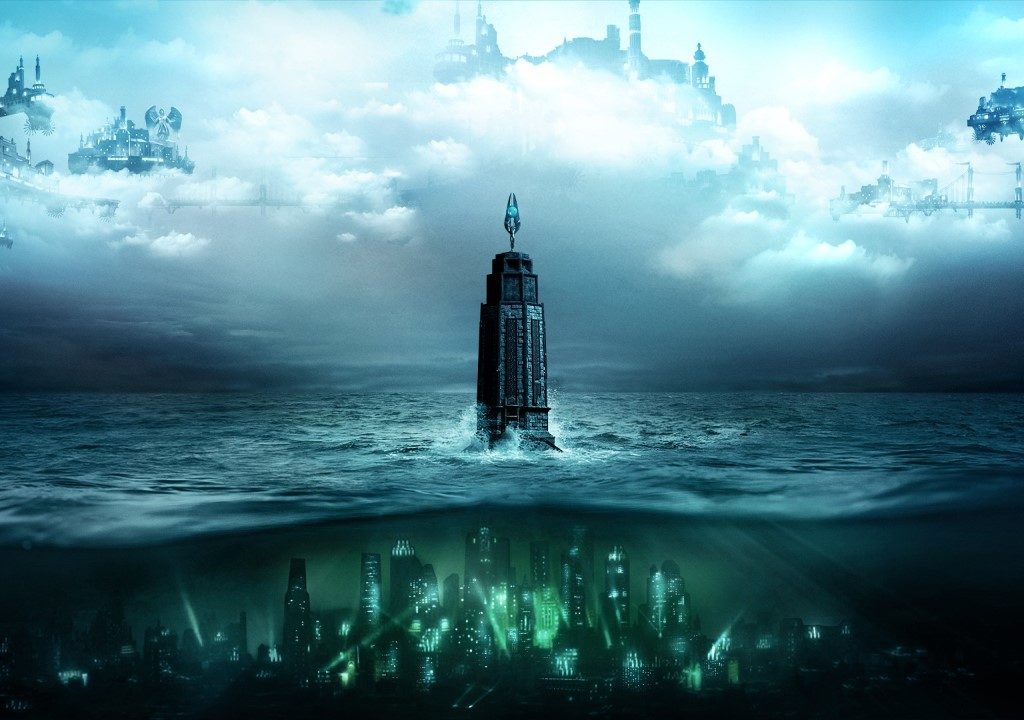Review: Bioshock – The Collection
There’s always a man. Always a girl. Always a lighthouse.
Starting back in 2007, the Bioshock series has stood out as one of the deepest in its commitment to exploring different philosophies in a first-person shooter/horror setting.
The series particularly looks at what happens when certain ideologies are allowed to roam free and create entire worlds in their image, unchecked by restraint or external authority. The result, seemingly invariably, is a nightmare, as the dark side of human beings’ nature (read: sin) ends up ruining the grand experiments, and undercutting what the people behind the philosophies set out to achieve in the first place.
In the first game, players experience Rapture, a world with No Gods, No Kings, Only Man. This underwater city was the brainchild of Andrew Ryan. With a philosophy similar to that of Ayn Rand’s Objectivism, Ryan views hard work, enterprise and initiative as human beings’ most important traits, and dismisses altruism as the misguided feeding of “parasites”.
Bioshock 2, on the other hand, sees the player return to a Rapture now run by Dr Sophia Lamb, a utilitarian who aims to provide the most amount of good for the biggest group of people. Unlike Ryan, Lamb believes in collective responsibility, but this time at the expense of the worth of individual human lives.
Bioshock: Infinite sees players leave the depths of the oceans for the skies, as they encounter Jeremiah Comstock, a self-styled prophet and American exceptionalist who has formed his own cult-like following and worships a twisted version of Christianity that also venerates (a misinterpreted version of) America’s founders.
Connecting all three of these separate games is a shared plot that becomes most clear at the end of Bioshock Infinite. Revealing exactly how is to engage in spoilers, however.
Is it someone new?
There is something satisfying about finally being able to play Bioshock on a Nintendo console after the series has appeared on virtually every other platform.
Whenever a game is ported to the Switch, the inevitable questions about performance enter in. Thankfully, there are no reasons to be concerned as Bioshock runs beautifully on Nintendo’s hybrid console. All three games all run smoothly in both docked and handheld modes, and there is little to no slowdown even when lots of characters are on screen. During Insights’ playthrough, the sole glitch to be had saw two enemies begin brawling, but with both characters continuously running against a wall. This, however, was more amusing than annoying and was not repeated.
The games manage to look beautiful, with the lighting looking particularly spectacular. The teams responsible for the port clearly have worked out how to make the most out of the hardware they have been given.
Of course, things are not perfect. The games are inevitably bigger than what a single Switch gamecard can store, and downloading some of the games are thereby necessary. This will require making room or buying a new SD card for most.
Playing through the games again allows for a fresh look back at the series’ strengths and weaknesses. In some ways, the first Bioshock is the most philosophically dense out of the three titles. The game features a plot twist in the second act that still stands as the game’s (early) peak.
In contrast to the first game, Bioshock 2 does not have as clear a worldview for the new villain, whose entire philosophy seems to be out of a collectivist reaction against Ryan’s objectivism. The game nonetheless manages to provide a heartwarming exploration about what it means to be a parent in a corrupt, decaying world.
Bioshock: Infinite still stands out as having one of the most impactful conclusions to any videogame, and playing through to see the threads is worthwhile.
Constants and variables.
In a previous article, Insights listed Bioshock as a videogame that Christians should play, largely for how the series handles its themes. All three titles explore religion in different ways.
The first Bioshock sees an industrialist forgo the influence of all faith and government in order to be free, left with only his own initiative and the sweat of his brow. And yet, despite Man’s best attempt to remove God, the would-be utopia of Rapture becomes a dystopic reminder of the forces of selfishness and greed and what they bring if kept unchecked.
On the other hand, the Bioshock 2 portrays corrupted religion that centres on a charismatic leader. It also explores how movements that offer heaven on earth and over emphasise the collective good can make individuals disposable.
Continuing with this theme Bioshock: Infinite portrays a corrupted Christianity, as blended with the forces of nationalism and hero worship.
Bioshock: Infinite also poses interesting questions about the nature of our choices and their consequences. While coming across as somewhat cynical about faith’s value, the game demonstrates how little rituals like baptism can achieve by themselves, if not accompanied by the process of discipleship.
Of course, the recommendation that Christians play these games comes with the caveat that Bioshock is a violent horror title and that your ability to engage with its themes will depend on how much you enjoy this genre.
For those who have played the Bioshock games before, the new Switch port offers a welcome return to the depths of Rapture or the clouds of Columbia. For those who have never done so, the release offers the opportunity to see what all the fuss was about.
Would you kindly take it up?
Bioshock: The Collection is now available on Nintendo Switch. It was previously released on PlayStation 4, Xbox One, and PC.













